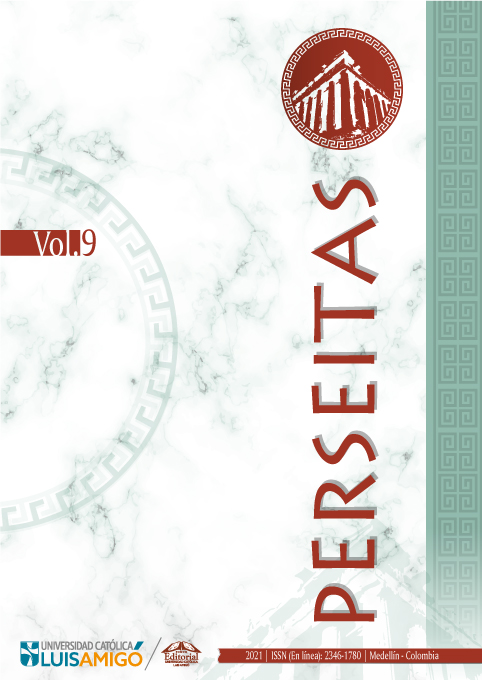Transhumanismo, pregunta a la naturaleza humana
DOI:
https://doi.org/10.21501/23461780.3981Palabras clave:
Transhumanismo, Sujeto ecológico, Tecnología, Sociedad, Naturaleza humanaResumen
El transhumanismo como filosofía e ideología tecnologicista tiene cada vez más adeptos y se sitúa en los ámbitos académicos como una posición positiva, posible y deseable. Su implementación aparece solapada en una vida cotidiana que depende, como nunca antes, de los avances tecnológicos. La posición que sostendremos en este artículo es que esta ideología, que sobredimensiona el papel de la tecnología en la sociedad, tiene una visión limitada respecto de los conflictos éticos, económicos y sociales que dimanan de sus presupuestos. El problema no es negar la tecnología, sino qué rol juega en la construcción de la sociedad. El transhumanismo puede estar vendiendo un falso sueño de libertad, donde la uniformidad, la ausencia de crítica, la discriminación y la separación radical entre pobres y ricos definan ese mundo paradisíaco que propone.
Descargas
Referencias
Ballard, D., Hayhoe, M., & Rao, P. P. (1997). Deictic Codes for the Embodiment of Cognition. Behavioral and Brain Sciences, 20(4), 723-767.
Bateson, G. (1972). Steps to an Ecology of mind. Collected Essays in Anthropology, Psychiatry, Evolution, and Epistemology. Chandler Publishing Company.
Beer, R. D. (1995). A dynamical systems perspective on agent-environment interaction. Artificial Intelligence, 72(1-2), 173-215.
Blake, C., Molloy, C., & Shakespeare, S. (Eds.). (2012). Beyond Human. From Animality to Transhumanism. Continuum International Publishing Group.
Bostrom, N. (2007). In Defense of Posthuman Dignity. Bioethics, 19(3), 202-214.
Bostrom, N., &. Savalescu, J. (2017). Mejoramiento humano. Teell Editorial.
Braidotti, R. (2013). Lo posthumano. Editorial Gedisa S.A.
Brooks, R. (1997). Intelligence without Representation. En J. Haugeland (Ed.), Mind Design II. Philosophy, Psychology, Artificial Intelligence (pp. 395-420). MIT Press.
Chalmers, D. (2012). A Computational Foundation for the Study of Cognition. Journal of Cognitive Science, 12(4), 323-357.
Church, A. (1937). Review of Turing 1936. Journal of Symbolic Logic, 2, 42-43.
Clark, A. (2008). Supersizing the Mind. Embodiment, Action, and Cognitive Extension. Oxford University Press.
Clark, A., & Chalmers, D. (1998). The Extended Mind. Analysis, 58(1), 7-19.
Clark, A., & Grush, R. (1999). Towards a Cognitive Robotics. Adaptative Behaviour, 7(1), 5-16. http://wexler.free.fr/library/files/clark%20
%281999%29%20towards%20a%20cognitive%20robotics.pdf
Constant, A., Clark, A., & Friston, K. J. (2021). Representation Wars: Enacting an Armistice Through Active Inference. Frontiers in Psychology, 11.
Cordeiro, J. L., & Wood, D. (2018). La muerte de la muerte. Centro Libros PAPF.
De Grey, A. (2013). El fin del envejecimiento. Lola Books.
Delgado, C. (1999). El cambio de racionalidad y la matematización del saber. Revista Colombiana de Filosofía de la Ciencia., 1(1), 63-83.
Delgado, C. J. (2007). Hacia un nuevo saber. La bioética en la revolución contemporánea. Editorial Publicaciones Acuario.
Drexler, E. (1986). Engines of Creation. The Coming Era of Nanotechnology. Anchor Books.
Fernández, G. (2018). La metáfora como proceso cognitivo [Tesis doctoral]. Universidad de La Habana, La Habana, Cuba.
Ferry, L. (2017). La Revolución Transhumanista. Como la tecnomedicina y la uberización del mundo van a transformar nuestras vidas. Alianza Editorial.
Fodor, J. (1987). Psychosemantics. MIT Press.
Fodor, J., & Pylyshyn, Z. W. (1988). Connessionism and Cognitive Architecture. A Critical Analysis. Cognition, 28(1-2), 3-71.
Fukuyama, F. (1989). ¿El fin de la historia? The National Interest, (16), 3-18.
Fukuyama, F. (2002). El fin del hombre: consecuencias de la revolución biotecnológica. Editorial B.
Habermas, J. (2001). El futuro de la naturaleza humana. ¿Hacia una eugenesia liberal? Editorial Paidós.
Hottois, G. (2016). ¿El Transhumanismo es un humanismo? Universidad El Bosque.
Kurzweil, R. (2012). La Singularidad está cerca. Cuando los humanos trascendamos la biología. Lola Books.
Lee, N. (2019). The Transhumanism Handbook. Springer.
Lida, F., & Pfeiffer, R. (2006). Sensing through body dynamics. Robotics and Autonomous Systems, 54(7), 631–640.
Lilley, S. (2013). Transhumanism and Society: The Social Debate Over Human Enhancement. Springer.
Lungarella, M., &. Sporns, O. (2006). Mapping information flow in sensorimotor networks. PLoS Computational Biology, 2(10), 1301-1312.
Manzocco, R. (2019). Transhumanism–Engineering the Human Condition: History, Philosophy and Current Status. Springer Praxis Books.
Marcos, A. (2018). Bases filosóficas para una crítica al transhumanismo. ArtefaCToS. Revista de estudios de la ciencia y la tecnología, 7(2), 107-125.
Marcuse, H. (1966). El Hombre Unidimensional. Ensayo sobre la ideología de la sociedad industrial avanzada. Editorial Instituto del Libro.
Marx, C. (1965). Manuscritos Económicos Filosóficos de 1844 . Editorial Política.
Maturana, H., & Varela, F. (1984). El árbol del conocimiento. Las bases biológicas del entendimiento humano. Lumen; Editorial Universitaria.
Milner, D., & Goodale, M. (1995). The Visual Brain in Action. Oxford University Press.
Neisser, U. (1993). The Perceived Self. Cambridge University Press.
Pilsch, A. (2017). Transhumanism. Evolutionary Futurism and the Human Technologies of Utopia. University of Minnesota Press.
Putnam, H. (1975). The nature of mental states. En H. Putnam (Ed.), Mind, Languague and reality: Philosophical Papers (vol. 2, pp. 429-440). Cambridge University Press.
Ranisch, R., & Lorenz, S. (2014). Post- and Transhumanism. An Introduction. Frankfurt am Main; Peter Lang Edition.
Sandel, M. (2007). The case against Perfection. Ethics in the Age of Genetic Engineering. Harvard University Press.
Savalescu, J. (2012). ¿Decisiones peligrosas? Una bioética desafiante. Tecnos.
Searle, J. R. (1997). Minds, Brains, and Programs. En J. Haugeland (Ed.), Mind Design II. Philosophy, Psychology, Artificial Intelligence (pp. 183-204). MIT Press.
Terrones, A. L. (2019). Una aproximación general al transhumanismo y su problematización. Análisis, 51(95), 319-345.
Tirosh-Samuelson, H., & Mossman, K. (2012). Building Better Humans? Refocusing the Debate on Transhumanism. Frankfurt; Peter Lang.
Turing, A. (1950). Computing Machinery and Intelligence, Mind, 59, 433-460.
Valdés, C. (2005). La educación ambiental y la ética ambiental: Reflexiones desde Cuba. En C. Valdés Menocal (Comp.), Selección de Lecturas Ecología y Sociedad, pp. 180-197. Editorial Félix Varela.
Van Gelder, T. (1995). What Might Cognition Be, If Not Computation? Journal of Philosophy, 92(7), 345-381.
Velázquez, H. (2009). Transhumanismo, libertad e identidad humana. Thémata. Revista de Filosofía, (41), 577-590. https://revistascientificas.us.es/
index.php/themata/article/view/594
Wilson, R. (2004). Boundaries of the mind: The individual in the fragile sciences—Cognition. Cambridge University Press
Publicado
Cómo citar
Número
Sección
Licencia
Derechos de autor 2021 Perseitas

Esta obra está bajo una licencia internacional Creative Commons Atribución-NoComercial-SinDerivadas 4.0.
La revista y los textos individuales que en esta se divulgan están protegidos por las leyes de copyright y por los términos y condiciones de la Licencia Creative Commons Atribución-No Comercial-Sin Derivar 4.0 Internacional.

















